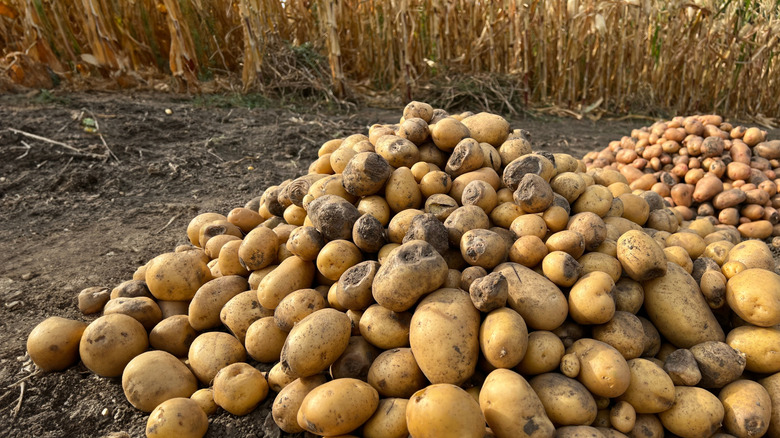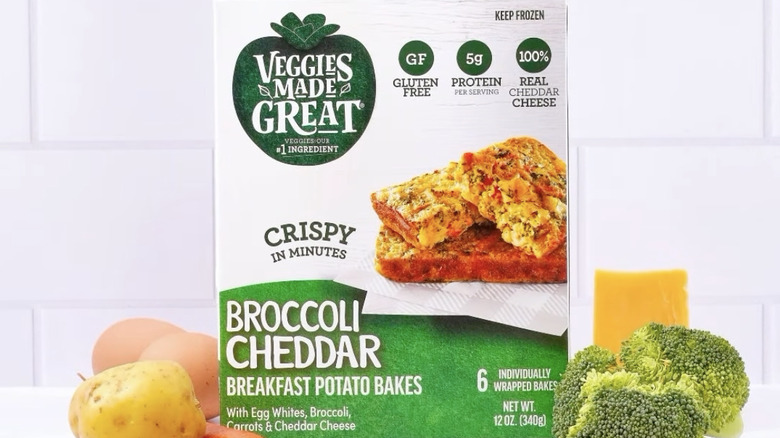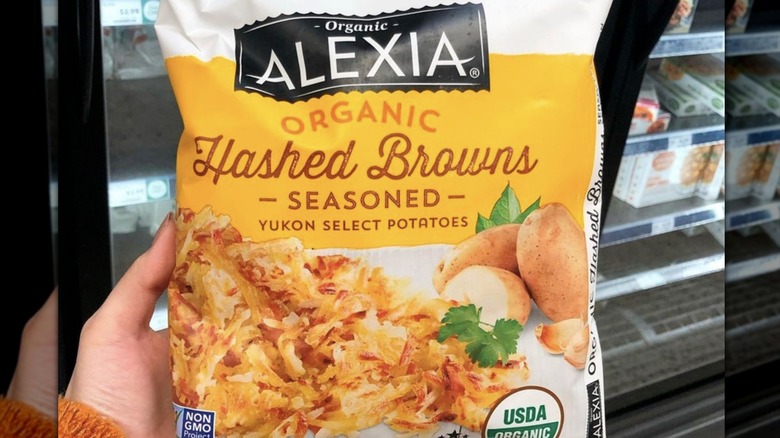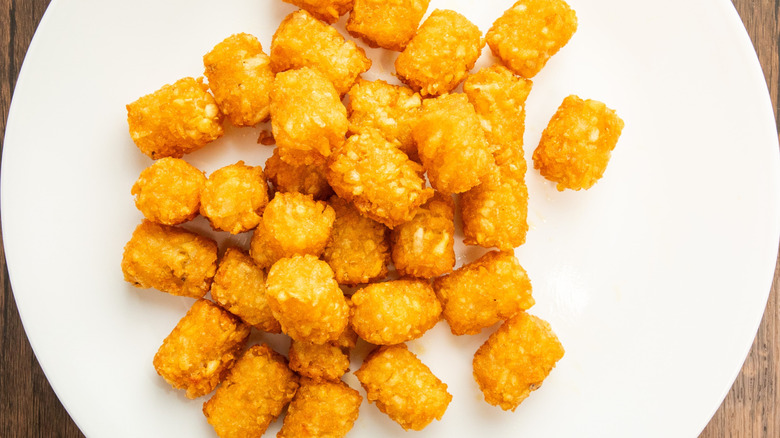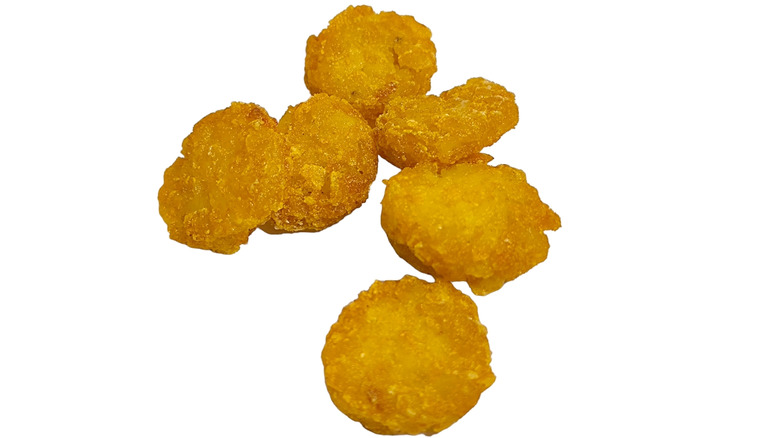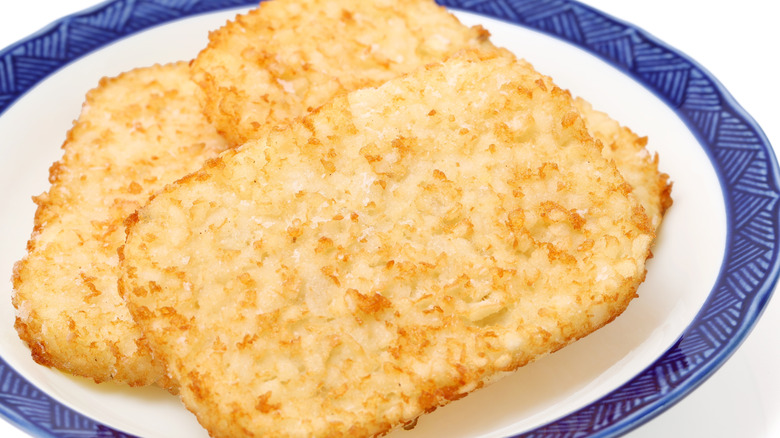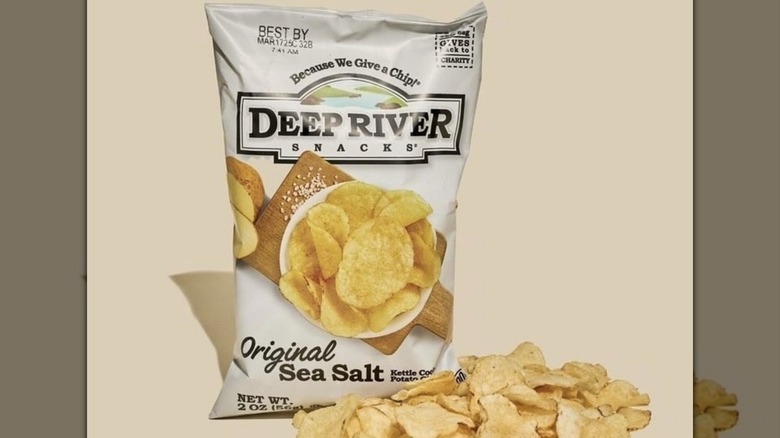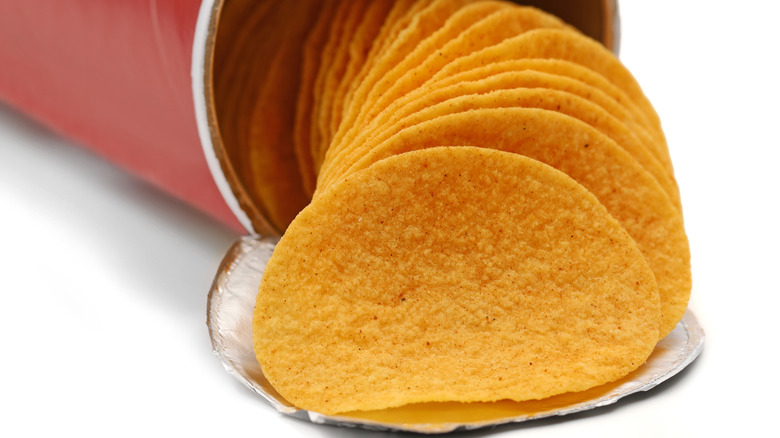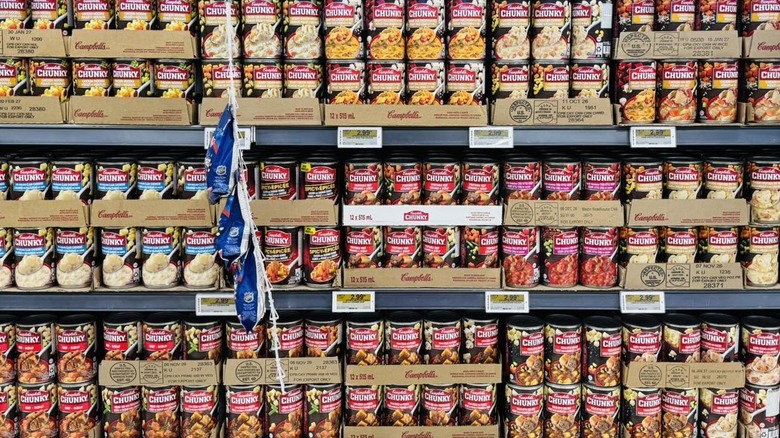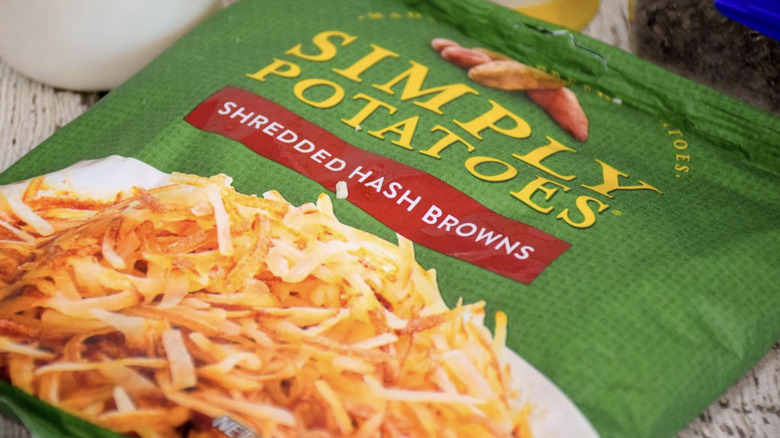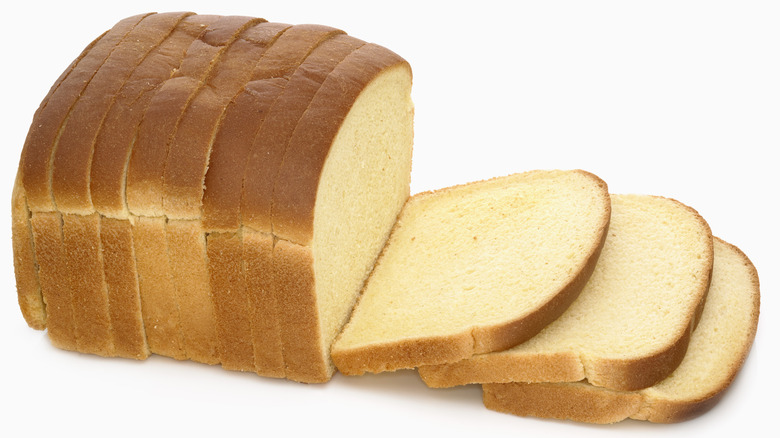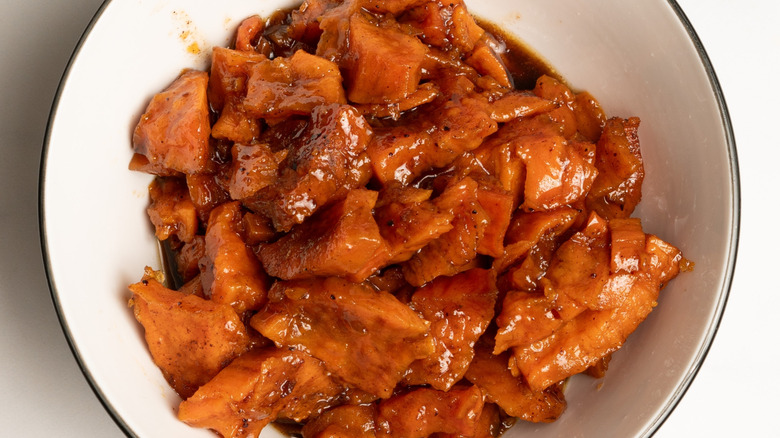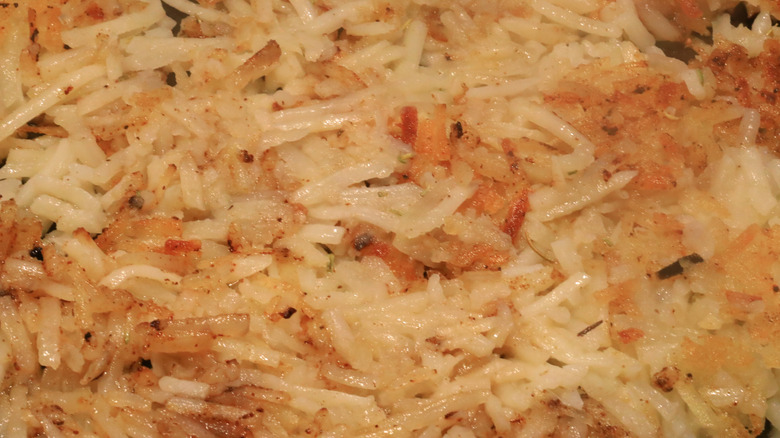The Biggest Potato Recalls In US History
We may receive a commission on purchases made from links.
The potato is a modest yet mighty food that has captured hearts and stomachs the world over. If a sack of potatoes isn't one of your personal pantry staples, there's a chance that another potato-based item is, because quite frankly, potatoes are the main ingredient in a lot of popular foods. That's why recalls that affect potato products sold in the U.S can affect food brands on a humongous scale.
Potato chips rank among the most popular snacks in the U.S., and hash browns are considered as a staple side for egg dishes. With these two examples alone, it's clear why several food manufacturers make millions of dollars just from selling potato-based foods. If one of these companies has to issue a recall of one or more of its products, immense amounts of retail-bound goods become unsalable. Recalls create huge financial losses in the business world, but they are a necessary precaution to keep the public safe.
Food recalls happen when a commercially sold product does not meet the federal regulations upheld by the Food and Drug Administration (FDA) and/or the United States Department of Agriculture (USDA). Contaminations from either foodborne pathogens or foreign materials, undeclared ingredients, and quality issues stemming from mold or spoilage are common recall reasons for many products — including foods made with potatoes. These are some of the biggest recalls to ever take place in the U.S. that involved potato-based products.
Veggies Made Great Broccoli Cheddar Breakfast Potato Bakes (2024)
Among the many producers of frozen breakfast foods, herbivore favorite Veggies Made Great was on a roll selling frittatas and other morning-meal goodies in U.S. grocery stores — until a massive recall in May 2024 threw a wrench in the operation. The recall dealt specifically with the brand's Broccoli Cheddar Breakfast Potato Bakes, which were being called back over a suspected contamination from listeria monocytogenes (L. monocytogenes). This pathogen is particularly dangerous to perishable foods because it can survive in cold — even freezing — temperatures for prolonged periods of time. After the recall announcement, Veggies Made Great began pulling boxes off of store shelves.
The quantity of recalled Broccoli Cheddar Breakfast Potato Bakes was significant — 10,544 boxes in all. Veggies Made Great sells its products through major retailers like Walmart, Target, and Costco, as well as many other popular grocery chains. The boxes that were possibly contaminated by L. monocytogenes were only sold in Arizona, California, Colorado, New Mexico, Nevada, and Utah.
This voluntary recall was issued by Veggies Made Great's parent company, New Classic Cooking LLC in Avenel, New Jersey. New Classic Cooking previously sold Veggies Made Great frozen products as a sub-brand of its Garden Lites label. The company did not divulge how L. monocytogenes may have adulterated the Broccoli Cheddar Breakfast Potato Bakes, or if any illnesses were linked to the recall.
Lamb Weston shredded hash browns (2022)
Since its founding in 1950 in Weston, Oregon, Lamb Weston has become one of the world's largest manufacturers of frozen potato products, with distribution to over 100 nations. The magnitude of Lamb Weston's output was emphasized in August 2022 when a recall of more than 1 million pounds of shredded hash browns was issued. The hash browns were at risk of contamination from L. monocytogenes — the bacteria that causes the foodborne illness listeriosis.
The recalled product was sold under the Alexia line as Organic Seasoned Hashed Browns Yukon Select Potatoes, as well as Great Value Shredded Hash Browns, Sprouts Organic Hash Browns Shredded Potatoes, and True Goodness by Meijer Organic Hash Brown Shredded Potatoes. Overall across the retail market, 1,087,200 pounds of hash browns were recalled. Alexia was hit the hardest, with 90,600 cases of hash browns recalled. Great Value, Walmart's in-house label, recalled 7,377 cases. Sprouts recalled 13,313 cases, while True Goodness by Meijer recalled 1,361 cases. The frozen potatoes were sold nationwide and in Guam, and in other countries throughout the Americas, East Asia, and the Middle East.
There were also non-retail hash browns to consider. Lamb Weston sold potentially dangerous shredded hash browns to food service institutions under the Lamb's Supreme Shredded IQF Hash Browns line. In a letter to customers, Lamb Weston disclosed that L. monocytogenes was found during product sampling, and may have affected shipments of hash browns dating back to February 2021.
Lamb's Supreme Tater Puffs (2019)
Mega potato purveyor Lamb Weston was also in trouble in April 2019, only this time its Supreme Tater Puffs were the problem. Since Lamb Weston cranks out an immense amount of frozen potato products, gargantuan recalls don't derail its operations. With this recall, Lamb Weston recalled over 680,000 pounds of frozen tots due to contamination by a foreign object ... and hardly anyone batted an eye.
In addition to selling its frozen spuds in grocery stores worldwide, Lamb Weston also sells products to institutions with cafeterias, such as hospitals and schools. The five-pound paper bags of Lamb's Supreme Tater Puffs that it sold on the non-retail market were the ones that needed recalling. The foreign object that afflicted these cafeteria-bound tots was plastic. The recall resulted in 22,789 cases of Lamb's Supreme Tater Puffs — distributed in 19 states — as being deemed unfit for consumption.
Foreign contaminants posed a huge obstacle to Lamb Weston's production in 2019. A month prior to this recall, 76,740 pounds of Lamb's Supreme Starz Hash Brown Patties were recalled for that very reason. And in November 2019, 72,576 pounds of Lamb Weston's Grown In Idaho Crispy Hash Brown Dices were recalled due to containing pieces of rubber.
Ore Ida Spud Bites (2019)
Ore Ida is a household name in prepackaged potato products, but the frozen Spud Bites that were recalled in September 2019 weren't sold in stores. After it was determined that some five-pound bags of Spud Bites shipped in unlabeled food-service bags may contain pieces of a hard foreign material, the product was declared unfit to serve. The voluntary recall was issued by Ore Ida's parent company, McCain Foods. In total, 84,900 pounds of Spud Bites were implicated in the recall.
McCain Foods manufactures potato-based products under its Ore Ida label, and while the company initiated this recall, it never publicized what the foreign contaminant was made of. However, this problem is not uncommon — during the first six months of 2019 alone, the amount of food recalled in the U.S. due to foreign-material contaminants totaled over 13 million pounds. Some of the most common foreign materials that sneak into food and cause recalls are plastic, metal, and rubber. Experts point to an increase in automated machinery on processing plant assembly lines as a primary culprit in foreign contaminant recalls.
McCain launched the Ore Ida Spud Bites recall in a timely manner, and the FDA terminated the recall on April 30, 2020. The afflicted Spud Bites were distributed in Indiana, Kansas, Mississippi, Ohio, Pennsylvania, and Virginia.
Lamb Weston Hash Brown Patties (2018)
If thousands of cases of frozen hash browns were recalled and you didn't hear about it in the news, this was likely because the recall came from Lamb Weston. For years, slip-ups in quality control have forced Lamb Weston — an international producer of frozen potato goods — to initiate massive recalls of its products, yet the company has largely managed to keep these recalls out of the press. The recall for its hash brown patties in September 2018 was a big one — 8,059 cases, to be exact. The hash browns were recalled because they possibly contained fragments of hard, clear plastic.
Lamb Weston sold the recalled hash brown patties under the product names Brookshire's Golden Hash Brown Patties, Hill Country Fare Breakfast Hash Browns Potato Patties, Market Pantry Hash Brown Patties, and Stater Bros. Hash Brown Patties Shredded Potatoes. The frozen hash browns were packed in cardboard trays and wrapped with plastic film. They were distributed to California, Florida, Iowa, Massachusetts, Maryland, Ohio, Pennsylvania, and Texas.
The FDA gave the recall a Class II designation due to the plasticky hash browns' capacity to cause temporary health damage to consumers. It appears that nobody was injured in relation to this recall of hash brown patties, which may be one of the reasons Lamb Weston has been able to keep its recall history on the down-low.
Varied Potato Chips (2016)
Many processed foods rely on a chain of suppliers to provide the ingredients that make iconic products what they are. This requires food companies to place a certain amount of trust in its chosen suppliers — and sometimes things don't go according to plan. When prominent U.S.-based milk powder supplier Valley Milk started churning out mass amounts of salmonella-contaminated milk powder in 2016, the ramifications rocked the potato chip industry. The food recalls that followed were enormous.
Multiple chip brands had tapped Valley Milk for milk powder to flavor potato chips. When Valley Milk announced a recall for its nonfat dry milk powder and sweet cream buttermilk in December 2016, more than a dozen chip varieties were recalled in connection to the compromised product. Old Dutch Foods — which sells chips under its own name brand, as well as Lund's & Byerly's, Urge, and Roundy's — recalled 2,513,706 units due to the Valley Milk recall. At the same time, Shearer's Foods recalled classic potato chips sold under several brand names, including Deep River, Larry the Cable Guy, Essential Everyday, and Delish.
This all originated from an investigation by the FDA into Valley Milk's production plant in Strasburg, Virginia. The authorities found this plant to be unsanitary, and they used whole genome sequencing (WGS) to trace salmonella-tainted products containing Valley Milk-supplied milk powder to the facility. Once confirmation was received, the FDA seized over 4 million pounds of Valley Milk products — the value of which was worth almost $4 million.
Varied Potato Chips (2010)
Potato chip brands that seasoned their chips with hydrolyzed vegetable protein (HVP) produced by Basic Food Flavors, Inc. were in a tough spot in 2010. The Las Vegas-based company recalled its HVP in February 2010, after a company that purchased and analyzed the product notified the FDA that the HVP tested positive for salmonella. News of the recall prompted numerous brands that sold potato chips containing Basic Food Flavors' HVP to launch secondary recalls.
Companies recalled chips in massive quantities. North Carolina-based chip brand Lance recalled 28,087 cases of its Tom's Barbecue Potato Chips from 34 states. Herr's Potato Chips — based in Pennsylvania — pulled two batches of its Cracked Pepper and Sea Salt Flavored Kettle Style Potato Chips from shelves as a precaution. Procter & Gamble recalled two limited-edition Pringles flavors — Restaurant Cravers Cheeseburger and Family Faves Taco Night — because they contained HVP supplied by Basic Food Flavors.
Potato chips were among over 100 product recalls associated with the Basic Food Flavors salmonella crisis. The FDA investigated the Basic Food Flavors facility and found the presence of salmonella. Following the investigation, the FDA alleged that the company was made aware of the salmonella bacteria in its processing facility and continued selling HVP anyway. Basic Food Flavors has vehemently denied this. As for how much HVP was recalled by the FDA? The company's sales and marketing manager told FoodNavigator-USA that "only 10,000 pounds of 10 million" was affected.
Campbell's Chunky Baked Potato with Cheddar & Bacon Bits soup (2007)
Few canned soup brands command household-name status to the level that Campbell's does — but a recall initiated on October 4, 2007 threatened to put a dent in the company's reputable legacy. The recall involved just one soup flavor: Campbell's Chunky Baked Potato with Cheddar & Bacon Bits. Campbell's had to recall 72,300 cans of this potato soup because there was one chunky ingredient inside that didn't belong: hard plastic pieces.
The recall created a huge amount of unsellable inventory for the brand, which had been producing a selection of Campbell's Chunky soup flavors since 1970. The recalled 18.8-ounce cans had already been shipped to 24 states before the recall was announced. In fact, the plastic pieces in the potato soup were brought to the attention of Campbell's following customer complaints.
Potato-based product recalls can be massive, yet many companies manage to get through the recall period without any related reports of consumer illness or injury. Campbell's wasn't so lucky. Prior to the recall announcement, the company received three reports of injury in or around the mouth because consumers ended up chomping on plastic pieces hidden within the thick soup. Campbell's eventually cleared up its plastic problem, and Chunky Baked Potato with Cheddar & Bacon Bits remain part of the lineup of Campbell's Chunky soup flavors.
Simply Potatoes Plain Shredded Hash Browns (2004)
When Minnesota-based company Northern Star recalled tens of thousands of pounds of frozen hash browns on December 22, 2004, food recalls were not the perpetual occurrence that they are today. Northern Star, which was established in 1951 and now operates as a subsidiary of Michael Foods, initiated a recall for Simply Potatoes Plain Shredded Hash Browns — one of the brand's signature products. The recall was needed after fragments of glass were found inside the hash brown bags.
It is the goal of every food manufacturer to catch any deviances in product quality before that product hits the retail market, yet all too often it doesn't work out that way. Northern Star had no choice but to address its subpar production practices after it received complaints that four bags of Simply Potatoes Plain Shredded Hash Browns sold in South Dakota were adulterated by bits of glass. The amount of recalled hash browns totaled 49,932 pounds. Northern Star's recall affected two product lots of these hash browns sold in 35 states. Despite the glass-contaminated product being within reach of consumers, no injuries were reported in relation to the recall.
Dutch Country Soft Potato Bread (2004)
Potato bread's origins date back to 18th-century Europe, but it is best known by today's consumers as the plastic-wrapped sandwich loaf with a yellowish hue. Dutch Country potato bread is sold by multiple food producers, yet it was the version from George Weston Bakeries that was behind a big-time recall in January 2004. The recall was issued for undeclared allergens.
The year 2004 saw landmark changes in how the U.S. approaches federally regulated food labels. After years of observing consistent omissions of major food allergens on product packaging, the FDA helped launch the Food Allergen Labeling and Consumer Protection Act of 2004, requiring all companies selling food products in the domestic marketplace to print allergen warnings on packages of food containing milk, soy, wheat, eggs, fish, shellfish, peanuts, or tree nuts. When packages of Dutch Country Soft Potato Bread produced by George Weston Bakeries were found to contain undeclared soy flour, whey protein, and milk, a huge recall was in order.
George Weston Bakeries removed 250,533 pounds of Dutch Country Soft Potato Bread from distribution on account of the product mislabeling. Recalling over a quarter of a million pounds of potato bread is a hard-knocks lesson for any food brand, but George Weston Bakeries appeared to take it in stride — for a while. In December 2021, George Weston sold its stake in the fresh and frozen bakery industry to FGF Brands Inc. for $1.1 billion.
Bright Harvest Candied Sweet Potatoes (2003)
The complicated relationship between the FDA and artificial food dyes has been going on for decades — in fact, the history of Red Dye No. 3 is intertwined with the FDA. Food manufacturers are perpetually drawn to these man-made color compounds as a way to give processed foods a visual glow-up for cheap and easy. This has been allowed in the U.S. as long as the manufacturer discloses the use of artificial coloring in its ingredients list. When the major sweet potato brand Bright Harvest forgot to be explicit in the fine print of its Candied Sweet Potatoes in 2003, it triggered one of the largest potato recalls in our nation's history.
There are lots of great sweet potato recipes out there, but sometimes convenience takes precedence and leads shoppers to the canned versions of popular sweet potato sides. When that happened, Bright Harvest was there to answer the call ... most of the time. On December 11, 2003, Bright Harvest's Candied Sweet Potatoes were recalled because they contained undeclared Yellow 6. This chemical food dye remains prevalent in processed foods to enhance the bright tones of myriad edible products. It's a legal additive in the U.S. — as long as its inclusion is listed on product packaging.
Bright Harvest's oversight caused 174,531 pounds of its Candied Sweet Potatoes to be removed from retail distribution. For some 40 years, the company, based out of Clarksville, Arkansas, was a leading manufacturer of sweet potatoes in the U.S. Today, the company no longer appears to be in business.
J.R. Simplot Company frozen hash browns (2003)
When industrialized processed potato products were in their infancy, J.R. Simplot was a trailblazer. His company supplied millions of pounds of dehydrated potatoes and onions to the U.S. military during World War II. Fast-forward to February 2003, and the J.R. Simplot Company was on the hook for a huge potato recall after hard plastic pieces were found in its frozen hash browns. The hash browns were sold under the Simplot label, as well as Nestlé and Lynden Farms.
Since it was 2003, J.R. Simplot's production error wasn't plastered across every digital news outlet then servicing the World Wide Web. Instead, the venerable company discreetly recalled 67,577 pounds of plastic-plagued hash browns. The recall was given a Class II designation by the FDA due to the choking hazard and potential for mouth injury that the plastic pieces presented. However, the recall apparently didn't cause long-term damage to company operations. The J.R. Simplot Company continues to thrive, primarily selling its frozen potato products to a wide range of food service institutions.
